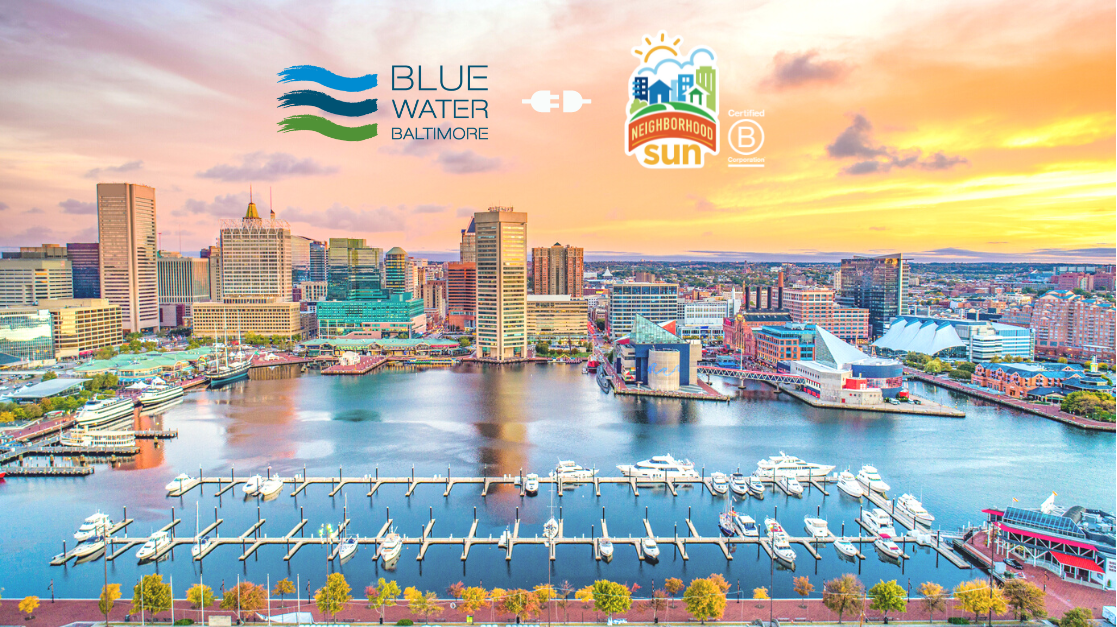
Baltimore’s electricity has been generated at the expense of surrounding community members’ health for decades, damaging local air and water quality by burning trash and fossil fuels for energy. When talking about fossil fuel pollution, the conversation usually focuses on how carbon emissions exacerbate climate change through the greenhouse effect, but there’s so much more than just that to consider. Burning fossil fuels also releases nitrogen oxides into the atmosphere, damaging our air quality before the nitrogen returns to the landscape in the form of smog or acid rain. When the excess nitrogen is then washed into nearby water bodies, it leads to harmful algal blooms that can choke out entire ecosystems.
Our dependency on fossil fuels directly harms every resource we depend on for life– from the air we breathe to the water we drink and the soils that grow our food. Environmental organizations like our partner nonprofit Blue Water Baltimore are essential to equipping communities with the tools needed to advocate for their health. Much like Blue Water Baltimore engages community members to understand and take local action against environmental issues through policy and citizen science, Neighborhood Sun provides them the opportunity to take action against climate change by supporting the renewable transition within their very own community.
We spoke with the leaders of Blue Water Baltimore and Neighborhood Sun to explore why these two organizations are essential to the environmental resiliency of community members. Both organizations prioritize community engagement and outreach to support a strong and elaborate network of local nonprofits, faith groups, and other organizations as they each pursue their missions, working to create more community partners and members, rather than more customers.
We cannot keep settling for energy sources that pollute our air, water, and soil while still leaving us vulnerable to the rising costs of being dependent on oil and gas. The time has come for an energy model that puts communities first, enabling the health and financial benefits of renewable energy to be felt locally, as well as globally, while protecting other resources like water and soil along the way. Fortunately for us all, that kind of energy model does exist and it’s known as community (or shared) solar.
In recent years, a mere 30% of the clean energy used in Maryland was actually produced here in our great state, but it doesn’t have to be that way. Thanks to community solar, anyone who pays an electric bill can now tap into the economic and health benefits of supporting local solar projects just by subscribing to get their share of clean energy each month. Neighborhood Sun is currently subscribing residents of all income levels and homeownership statuses (renters, here’s to you!) in the Baltimore Gas & Electric (BGE) service region to a nearby community solar project fittingly known as Rivers Community Solar Farm (Rivers for short).
Rivers was constructed on land that previously served as a farm so no trees were cut down in the process. The development process actually did quite the opposite, planting 32 shade trees, 193 evergreen trees, and 59 shrubs so the site can double as a native pollinator habitat while powering hundreds of local residences with renewable energy. When you subscribe to get your share of energy from the community solar farm each month, you save 10% on clean energy compared to standard BGE rates, no matter how much they fluctuate. Less pollution in our air and more money in your pocket… What’s not to like?
In the environmental space, it’s easy to recognize that a win for one of us is a win for all, so we’re grateful to support and uplift each other through community partnerships like the long-standing one between Maryland-based organizations Blue Water Baltimore and Neighborhood Sun.
Learn more about how you can save 10% on energy costs by supporting clean, local energy through community solar.
If you are getting solar from: